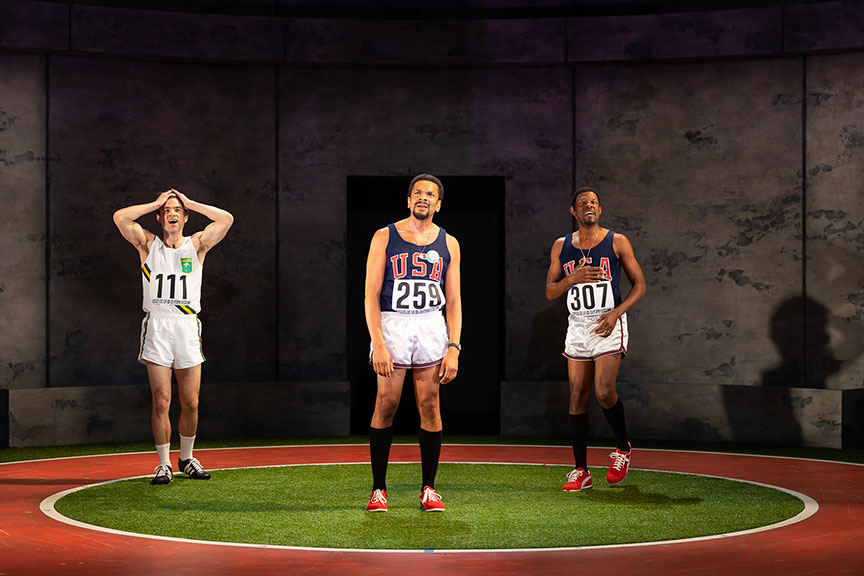|
Left to right: Patrick Marron Ball, Biko Eisen-Martin and Korey Jackson in "The XIXth." Photo by Rich Soublet II Thank you, Kemp Powers. Your new play “The XiXth” will remind people of a significant moment in sports and civil rights history that many have forgotten or overlooked: the 200-meter medal ceremony at the 1968 Summer Olympics in Mexico City in which winner Tommie Smith and silver medalist John Carlos raised black-gloved fists to the sky during the playing of the national anthem.
I was just a child at the time and I don’t remember whether I even understood what Smith and Carlos were doing. But as I grew older and more educated about Black Americans’ struggle for equality, freedom and dignity, I came to appreciate the bravery that the two American sprinters showed that day in Mexico City. Powers’ play, getting its world premiere at the Old Globe Theatre, recounts what preceded Smith’s and Carlos’ protest and what followed in the days and years afterward. Not unlike Powers’ “One Night in Miami,” “The XIXth” imagines the convergence of major, related figures in the Black American experience. In real life and in this play, it did happen that 1936 Olympics hero Jesse Owens met with Smith ahead of the gold-medal race and implored him not to do anything risky. Smith’s attempt at reconciliation for rebuffing his idol’s advice (on the basis of Owens’ relationship with International Olympic Committee chair (and known racist) Avery Brundage, did not actually happen, though in this tense drama it’s one of the more revealing scenes. Perhaps “The XIXth,” like Powers’ “One Night in Miami,” will go from stage to screen one day. It should. More people need to learn the intricacies of this story. And to a greater extent than “One Night,” “The XIXth” might work better on film than it does on the stage, where intimations of running a race are difficult to reproduce in a theater and the sudden arrival of monologues (from Korey Jackson as Smith and Biko Eisen-Martin as “Los”) while in the starting block don’t feel very organic. Time periods shift back and forth in this lengthy one-act directed by Carl Cofield. The play opens in 2006 with an older Smith and Los at a funeral service in Australia for the Aussie runner, Pete Norman (Patrick Marron Ball), who won the silver in Mexico City and joined the two Americans in protest on the medal stand, thereby becoming friends with both of them. Soon it’s back to the ‘60s, with young Smith and Los college track stars and (at least in Los’ case at the outset) disciples of educator and civil rights activist Harry Edwards. Even with all the time tripping, the focal period of the story are the days and hours leading up to the 200-meter finals in Mexico City. Avery Brundage, played as utterly despicable by Mark Pinter, tries to enlist Aussie Norman as a kind of great white hope. It doesn’t work. As for Tommie Smith and John Carlos, there’s a tug-o-war about going through with the protest, almost right up until the race. Eisen-Martin most definitely has the showier part in “The XIXth.” Los’ passion is unrelenting and he enjoys being a big personality. The inner conflict resides mostly in Smith. Jackson, reflecting the gamut of the emotions this man must have been feeling, is the heart and conscious of this production. Ball is sincere and principled as Norman though his Down Under accent is difficult to decipher. As the elder Jesse Owens, Michael Early is stalwart. As is customary with Globe main theater productions, the technical accoutrements are exceptional and the transitional music (and sound design) by David R. Molina exciting. “The XIXth” runs through April 23 at the Old Globe Theatre in Balboa Park.
0 Comments
Leave a Reply. |
AuthorDavid L. Coddon is a Southern California theater critic. Archives
July 2024
Categories |
David Coddon |
|
